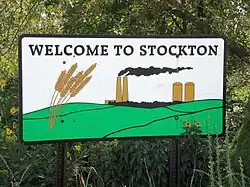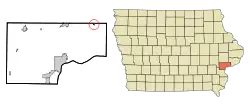Stockton, Iowa
Stockton is a city in Muscatine County, Iowa, United States. The population was 176 at the time of the 2020 census.[2] It is part of the Muscatine Micropolitan Statistical Area.
Stockton, Iowa | |
|---|---|
 | |
 Location of Stockton, Iowa | |
| Coordinates: 41°35′29″N 90°51′28″W | |
| Country | |
| State | |
| County | Muscatine |
| Area | |
| • Total | 0.11 sq mi (0.28 km2) |
| • Land | 0.11 sq mi (0.28 km2) |
| • Water | 0.00 sq mi (0.00 km2) |
| Elevation | 728 ft (222 m) |
| Population (2020) | |
| • Total | 176 |
| • Density | 1,614.68/sq mi (625.35/km2) |
| Time zone | UTC-6 (Central (CST)) |
| • Summer (DST) | UTC-5 (CDT) |
| ZIP code | 52769 |
| Area code | 563 |
| FIPS code | 19-75450 |
| GNIS feature ID | 0462002 |
History
Stockton was laid out at the time the railroad was built through it. Stockton was a depot on the Chicago, Rock Island and Pacific Railroad.[3]
Geography
Stockton is located at 41°35′29″N 90°51′28″W (41.591484, -90.857679).[4]
According to the United States Census Bureau, the city has a total area of 0.11 square miles (0.28 km2), all land.[5]
Demographics
| Year | Pop. | ±% |
|---|---|---|
| 1870 | 108 | — |
| 1880 | 116 | +7.4% |
| 1910 | 138 | +19.0% |
| 1920 | 128 | −7.2% |
| 1930 | 110 | −14.1% |
| 1940 | 124 | +12.7% |
| 1950 | 165 | +33.1% |
| 1960 | 164 | −0.6% |
| 1970 | 222 | +35.4% |
| 1980 | 240 | +8.1% |
| 1990 | 187 | −22.1% |
| 2000 | 182 | −2.7% |
| 2010 | 197 | +8.2% |
| 2020 | 176 | −10.7% |
| Source:"U.S. Census website". United States Census Bureau. Retrieved March 29, 2020. and Iowa Data Center Source: | ||
2010 census
As of the census[7] of 2010, there were 197 people, 73 households, and 52 families living in the city. The population density was 1,790.9 inhabitants per square mile (691.5/km2). There were 76 housing units at an average density of 690.9 per square mile (266.8/km2). The racial makeup of the city was 92.9% White, 1.5% African American, 0.5% Native American, 0.5% from other races, and 4.6% from two or more races. Hispanic or Latino of any race were 0.5% of the population.
There were 73 households, of which 43.8% had children under the age of 18 living with them, 52.1% were married couples living together, 8.2% had a female householder with no husband present, 11.0% had a male householder with no wife present, and 28.8% were non-families. 23.3% of all households were made up of individuals, and 1.4% had someone living alone who was 65 years of age or older. The average household size was 2.70 and the average family size was 3.02.
The median age in the city was 36.3 years. 29.4% of residents were under the age of 18; 9.7% were between the ages of 18 and 24; 24.3% were from 25 to 44; 27.9% were from 45 to 64; and 8.6% were 65 years of age or older. The gender makeup of the city was 50.3% male and 49.7% female.
2000 census
As of the census[8] of 2000, there were 182 people, 72 households, and 52 families living in the city. The population density was 1,656.3 inhabitants per square mile (639.5/km2). There were 80 housing units at an average density of 728.1 per square mile (281.1/km2). The racial makeup of the city was 99.45% White, 0.55% from other races. Hispanic or Latino of any race were 3.30% of the population.
There were 72 households, out of which 36.1% had children under the age of 18 living with them, 55.6% were married couples living together, 11.1% had a female householder with no husband present, and 26.4% were non-families. 25.0% of all households were made up of individuals, and 5.6% had someone living alone who was 65 years of age or older. The average household size was 2.53 and the average family size was 2.92.
In the city, the population was spread out, with 28.6% under the age of 18, 7.1% from 18 to 24, 30.8% from 25 to 44, 25.3% from 45 to 64, and 8.2% who were 65 years of age or older. The median age was 35 years. For every 100 females, there were 114.1 males. For every 100 females age 18 and over, there were 100.0 males.
The median income for a household in the city was $35,417, and the median income for a family was $28,438. Males had a median income of $28,750 versus $20,313 for females. The per capita income for the city was $17,003. About 6.8% of families and 6.3% of the population were below the poverty line, including 11.1% of those under the age of eighteen and none of those 65 or over.
References
- "2020 U.S. Gazetteer Files". United States Census Bureau. Retrieved March 16, 2022.
- "2020 Census State Redistricting Data". census.gov. United states Census Bureau. Retrieved August 12, 2021.
- Richman, Irving Berdine (1911). History of Muscatine County, Iowa: From the Earliest Settlements to the Present Time. S. J. Clarke Publishing Company. p. 246.
- "US Gazetteer files: 2010, 2000, and 1990". United States Census Bureau. February 12, 2011. Retrieved April 23, 2011.
- "US Gazetteer files 2010". United States Census Bureau. Archived from the original on January 12, 2012. Retrieved May 11, 2012.
- "Census of Population and Housing". Census.gov. Retrieved June 4, 2015.
- "U.S. Census website". United States Census Bureau. Retrieved May 11, 2012.
- "U.S. Census website". United States Census Bureau. Retrieved January 31, 2008.